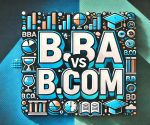The subjects of M Com 2 year courses focus on specialized and core topics regarding commerce, finance, and management. It trains the students to gain expertise in areas such as accounting, business studies, taxation, marketing, and research methods. It is divided into two years, where in the second year, the courses have advanced topics and elective courses. M.Com 2nd year subjects are mainly theoretical and practical to make the students ready for professional challenges.
This article deals with the M.Com subjects list, third and fourth semesters, elective options, and recommended study materials for the second year.
M.Com Course
The M.Com is one of the most sought postgraduate courses in commerce. The course will be helpful to those seeking advanced knowledge and skills for a finance, accounting, or business management career. It is a two-year semester-based course.
What Does the M.Com Course Involve?
The M. Com course is on commerce and business principles. This course provides the students with specialized skills in areas like financial management, organizational behavior, taxation, and marketing. The courses strike a balance between theoretical ideas and practical training. The program helps students gain expertise in their M. Com major subjects and are ready for jobs and roles in corporate organizations, academia, or for entrepreneurship.
M. Com Course Structure
- M com course has 2 years (4 semesters)
- Credits: Generally 72 to 80 credits but differ from college to college
- Specialization: Some colleges provide honors or specializations such as accounting, finance, and taxation
- Eligibility: Bachelor’s in commerce or equivalent
- The second year curriculum of the course has more advanced and electives and therefore provides for specialization for students.
M.Com Core and Elective Subjects
M.Com is a postgraduate course that goes for two years, providing knowledge about the concepts of commerce, finance, accounting, and management in detailed information. The core subjects along with the elective subjects provide an all-round syllabus for theoretical learning as well as practical application. All the fundamental concepts in accountancy, taxation, managerial economics, and corporate law are covered in the M.Com core subjects for all students. The M. Com elective courses are categorized under a preferred branch: banking, entrepreneurship, human resources, and international finance.
M Com 2 Year Subjects: Semester Wise List
M.Com 2nd year subjects deal with issues of greater complexity in finance, communication, taxation, trade, and technology. It is offered through two semesters: Semester 3 and Semester 4, which are taken to cover both theoretical and practical learning for excellence in commerce and business. Final semester incorporates research and internship activities for holistic hand-on experience. Below is a detailed explanation of each subject included in M.Com 2nd year.
M com Semester 3 Subjects
1. Financial Management: Financial Management is a core subject that teaches students how to manage an organization’s financial resources effectively. It emphasizes decision-making in areas like investment, financing, and dividend policies.
Important Topics in Financial Management
- Capital Budgeting: Techniques for assessing long-term investment projects.
- Cost of Capital: The cost of capital from different sources.
- Working Capital Management: This refers to the management of short-term assets and liabilities in order to maintain liquidity.
- Risk and Return Analysis: This is computation for risk vs expected returns on investment
This course helps the students handle the financial requirements of a business to make it profitable and grow.
2. Managerial Communication: Managerial Communication includes skills about communication in a business environment. This includes oral and written communication, report preparation, and presentation.
Key Topics in Managerial Communication
- Business Correspondence: Writing formal letters, emails and memos
- Interpersonal Communication: Skills about handling employees and stakeholders
- Presentation Skills: Preparation of presentation and making a presentation.
- Conflict Resolution: Making effective communication possible in the management of workplace conflict.
This will equip the learner with good communication skills and an integral part of leadership as well as management.
3. Management of Financial Services: This course introduces the student to the financial services industry, which comprises banking, insurance, and mutual funds. It explains the management and functioning of financial institutions.
Key Topics in Management of Financial Services
- Banking Services: Understanding loans, credit facilities, and deposit schemes.
- Insurance Services: Life, health, and general insurance products.
- Mutual Funds and Investments: Investment options in mutual funds and SIPs.
- Wealth Management: Wealth management for personal and corporate clients for financial security.
This course is designed to familiarize the student with financial services and prepare him/her for banking and financial services employment.
4. International Trade – Theory & Practice
This course addresses the concepts and practices of international trade, which also involve export-import operations and trade policies.
Major Concepts in International Trade
- Theories of Trade: Understand comparative advantage and free trade
- Trade Policies: Learn about tariffs, quotas, and government intervention.
- Export-Import Procedures: Studies of documentation, shipping, and payment systems.
- International Trade Organizations: Study of the function of WTO, IMF and World Bank in international trade.
It prepares the students to work in the international markets with international business practices and trade policies.
M com Semester 4 Subjects
1. Essentials of Income Tax: This course introduces the basic laws of India relating to income tax. This course mainly covers tax calculation and tax compliance.
Important Issues in Elements of Income Tax
- Income Tax Basics: Definition, scope, and nature of income.
- Tax Computation: Calculating taxable income and liability to tax for individuals and businesses.
- Deductions and Exemptions: Understanding the tax-saving avenues available under the Income Tax Act.
- Tax Return Filing: How to file returns and comply with the tax laws.
This course is a must for students who plan to enter careers in taxation, accountancy, or financial consulting.
2. Mergers & Acquisitions
Mergers & Acquisitions is related to the strategy, legal perspective, and the financial implications of corporate restructuring.
Important Issues in Mergers & Acquisitions
- Types of M&A: Horizontal, vertical, and conglomerate mergers
- Valuation Techniques: Valuation of firms involved in M&A deals
- Regulatory Frameworks: Legal prescriptions relating to mergers and takeovers
- Post-merger integration: How to handle cultural and operational changes post the merging process.
This course gives the student knowledge about how M&A transactions impact businesses and economies, thereby preparing students for corporate finance or consultancy careers.
3. E-Commerce
E-Commerce refers to the use of digital platforms to carry out business transactions. It covers online business models, digital marketing, and technology to conduct commerce.
Key E-Commerce Topics
- E-Commerce Platforms: Understanding the likes of Amazon and Flipkart online marketplaces.
- Payment Gateway: Online payment facility- UPI, credit cards and PayPal
- Digital Marketing: Knowing SEO, social media marketing, and e- mail marketing
- Cybersecurity: Safety of online transactions and data.
This program will ensure that students are well prepared to perform optimally in the digital economy through skills learned in online businesses management.
4. Research and Internships
The theoretical knowledge is put into practical settings by research and internships. The research develops analytical and problem-solving skills, while the internship gives industry exposure.
Key Topics Covered in Research and Internships
- Research Methodology: A comprehensive study of how to design, conduct, and present research studies.
- Data Analysis: Interpretation of research data with statistical tools.
- Industry Exposure: Practical experience through internships in corporate firms.
- Dissertation: A report on detailed findings in research.
This module fills the gap between the academic world and the industrial world, so that students are prepared for the job.
M.Com Core Subjects
The M.Com core subjects are the basic backbone for advanced knowledge in commerce. This area focuses on key topics, such as accounting, management, taxation, and economics. A detailed elaboration of core subjects is described below.
1. Managerial Accounting & Decision Making
Managerial Accounting revolves around the application of accounting techniques to decision-making. It equips students with cost analysis, performance measurement, and strategic decision-making skills. Major Headings in Managerial Accounting
- Standard Costing: Techniques for the establishment and performance measurement
- Budget and Budgetary Control: Technique of budgeting and its control.
- Responsibility Accounting: Performance measure of departments and accountability
- Divisional Performance Analysis: Measurement of the efficiency and profitability of the different business units
- Cost Behavior and Profit Analysis: Connection between cost, sales, and profits
2. Accounting Theory & Practice
This module will provide a grounding in the core principles and practices of accounting. The module deals with the aspects of financial reporting, techniques of valuation, history of accounting standards, and use in practical cases. Important accounting theory
- Accounting objectives and scope
- Standards for financial accounting and corporate reporting
- Assets and liabilities valuation
- Depreciation, capital valuation, and corporate profits.
- Recently happened accounting practice developments.
3. Business Environment
Business Environment is a subject meant for students who understand the outside pressures on businesses, which can also be defined in terms of areas such as the socio-economic environment, technological, and political. Important Topics for Business Environment
- Trends emerging within the business environment.
- Socio-economic, political, and natural phenomena effects on businesses.
- Impact of Technology on commerce
4. Corporate Tax Planning
Corporate tax planning is all about tax laws; and their impact upon businesses, including how companies would reduce their tax burden legally. Major Topics in Corporate Tax Planning
- Corporate tax calculation and tax planning methods.
- Tax evasion and tax avoidance practices.
- Foreign tax laws and their implications on indigenous companies.
5. Corporate Laws
Corporate Laws covers the legal matters of conducting business. Students attain knowledge about mergers, intellectual property rights, and regulatory policies. Key Areas of Corporate Laws
- Intellectual property rights and patent legislations .
- Doctrine of indoor management
- Merger, acquisition, and corporate restructuring legal requirements.
6. Financial Management
Financial Management instructs students on how to manage the firm’s finances. There is more emphasis on investment planning, risk management, and capital budgeting. Important topic areas of Financial Management
- Capital structure and investment decisions
- Corporate reorganization and financial planning
- Management of working capital and dividend policies
7. Managerial Economics
Managerial economics is the combined study of theories of economics and business usage. Managerial economics mainly focuses on market analysis as well as the consumer analysis in which the decision is taken. Important Topics of Managerial Economics
- Demand research and consumer psychology
- Cost groupings and various production activities
- Pricing policies along with market condition analysis.
8. Marketing Management
This involves knowing how to sell and market a service or product by analyzing consumer behavior. Essential Issues in Marketing Management
- Marketing planning, organizing, and controlling.
- Pricing, promoting, and distributing ways for products.
- E-Marketing and international marketing
9. Organization Theory and Behavior
It is a knowledge-based learning concerning the design of organizations, behavior of employees, and leadership models. It allows the learner to control teams.
Subcategories of Organization Theory Organisational culture and organisational development.
- Theories of motivation and ways of managing conflict.
- Styles of leadership and approaches to decisions.
10. Security Analysis and Portfolio Management
It deals with the investment approach and portfolio managing techniques. They are taught on the risk associated with the yield, as well as return, obtained through financial assets.
Security Analysis Focus Points
- Investment and Portfolios
- Return-risk analysis related to fixed or variable income financial instrument
- Classical and modern models of portfolio.
M.Com Elective Subjects
The M. Com elective subjects allow the student to specialize in a field of his preference. The electives allow a student to specialize in the areas like banking, IT, entrepreneurship, and finance.
1. Banking & Finance
Banking operations and regulations with risk management is the concentration of this elective. It deals with topics like corporate banking, monetary policies, Basel norms, etc.
- Key Topics in Banking & Finance
- Banking law and regulation of finances.
- Risk management and credit analysis.
- Banking sector Mergers and acquisitions
2. Entrepreneurial Management
This course will equip entrepreneurs with entrepreneurship skills through designing business models, managing a start-up, and raising capital.
- Key topics covered in Entrepreneurial Management
- Venture capital and crowdfunding.
- Business ethics and social responsibility.
- Product development and innovation strategies.
3. Environmental Economics
This elective has an emphasis on sustainability and the environmental impact of business activities.
- Key topics covered in Environmental Economics
- Carbon trading and sustainable development.
- Environmental policies and biodiversity conservation.
- Cost-benefit analysis and environmental impact assessments.
4. Financial Markets
Financial Markets of study includes capital markets, forex markets, and derivatives. By reading this course, students acquire knowledge in their financial instruments and investment banking.
- Major Topics in Financial Markets
- Capital market efficiency and regulatory frameworks.
- Forex markets and asset pricing.
- Bond and stock markets risk management
5. IT Systems & Business Technology
This elective shows students how technology can be applied in the functions of a business. It covers cybersecurity, data management, and new emerging technologies such as blockchain.
- Major Themes in IT Systems
- Cybersecurity and cloud computing.
- E-business strategies and IT governance.
- IT risk management and mobile technologies.
6. Human Resource Management
This is a subject that covers employee relations and the development of those within an organization.
- Major Themes in Human Resource Management
- Recruitment and training.
- Performance management and appraisals.
- Employee engagement and work ethics.
7. International Finance
International Finance is the study about the world financial systems and foreign exchange markets.
- Major Topics in International Finance
- Cross-border mergers and world investments .
- International trade finance and exchange rate mechanisms
- International financial institutions’ role in international trade
8. Strategic Cost Management
Strategic Cost Management is the study about the sophisticated costing techniques to enhance profitability.
- Major Topics in Strategic Cost Management
- Cost estimation techniques and value chain analysis
- Process costing and budgeting
- Performance measurement and evaluation
Books and Authors Related to M.Com
Books are essential in forming knowledge and skills of M.Com students. M.Com is a diversely specialized program, with the specializations such as accounting, finance, taxation, marketing, and many others. Therefore, students have to refer to several academic resources, which are available in the books. Here is the list of very recommended books for M.Com students with their authors, along with the brief description of every book.
| Book Title | Author(s) |
| Principles of Accounting | Dixon Cooper, Mitchell Franklin, Patty Graybeal |
| Financial Management | I.M. Pandey |
| Organisational Behaviour | SP Robbins |
| Business Taxation | Radhakrishnan P |
| Cost Accounting | M P Gupta |
| Investment Analysis and Portfolio Management | Frank K Reilly, Keith C Brown |
M com 2 year Subjects FAQs
1. What are the M.Com 2nd year subjects?
M.Com 2nd year subjects include research methodology, financial management, international business, and elective courses in the areas of marketing or accounting.
2. Which of these are the core M.Com 3rd semester subjects?
Core subjects of M.Com 3rd semester are research methodology, financial management, international business, and taxation laws.
3. Are electives allowed in the M.Com course?
Yes, students can opt for electives in the 4th semester. University wise options differ. Marketing, accounting, and HR management are a few to name.
4. Is project submission mandatory for M.Com 2nd year?
Yes, students need to submit a project or dissertation in the 4th semester. It brings the theoretical concepts to practical issues.
5. What is the Full form of M.Com?
Full form of M.Com is Master of Commerce, which is a postgraduate study in commerce and accounting and finance.


